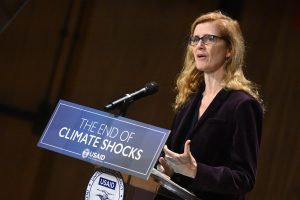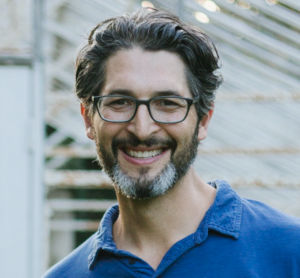This is a segment of a story that was written by Emily Gaines Buchler, and originally appeared in the Hub.
Climate disasters occur so frequently that they no longer shock us. Yet the world is doing far too little to combat climate change and prepare countries for the disasters that will inevitably befall them, Samantha Power said Tuesday morning during an address at the Johns Hopkins University Bloomberg Center in Washington, D.C.

Samantha Power
“Many have become numb to the images of orange skies choked with wildfire smoke, cities turned into rivers, [and] roads and doorknobs literally melting in the scorching heat,” said Power, the 19th administrator of the U.S. Agency of International Development, or USAID, an independent agency of the U.S. government that leads the country’s development and humanitarian efforts in more than 100 nations worldwide. “Despite the fact that we know these disasters will continue, despite the fact that we all expect them to get much worse, the world is still not investing in preparing our communities for these disasters at anywhere near the scale that we need.”
In this sense, we are all vulnerable—and must act quickly to deter the catastrophes that “have lost the power to shock our psyches [but] are, in fact, massively shocking our systems [and] destroying crops and infrastructure and livelihoods,” Power said, adding later that “climate shocks have thrown millions into hunger and reversed progress in combating diseases—from malaria to dengue fever to cholera in Africa.”
The solution, she told the crowd of more than 750 in-person and online listeners, is twofold: First, we must accelerate our efforts to reduce fossil fuel emissions and transition to renewable energies; second, we must equip countries and communities with the tools and resources they need to become climate resilient and avoid the devastating consequences of rising temperatures.
For much of the audience, made up not just of students but also faculty, alumni, and members of the public, Power’s talk served as motivation to continue working on climate solutions as well as a critical reminder of the human side of climate change—and how it affects communities at a granular level.

Benjamin Link
“We’ve seen tremendous growth in renewable energy, but [as Power pointed out,] the human dimension and community level [have often been overlooked],” said Benjamin Link, managing director of the Ralph O’Connor Sustainable Energy Institute at Johns Hopkins, which integrates efforts across the university to create and implement clean, renewable, and sustainable energy technologies.
“In the U.S., our carbon emissions peaked in 2005, and we’re on a downward trajectory, but that’s not true of many industrialized countries,” Link continued. Nevertheless, “we need to be part of the solution because, really, we’re all in this together. We have one atmosphere that we share … and we need to think of this as a common goods and a collective effort.”
